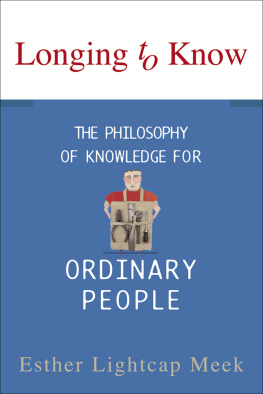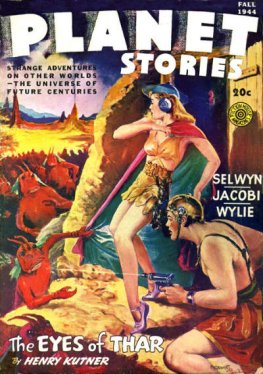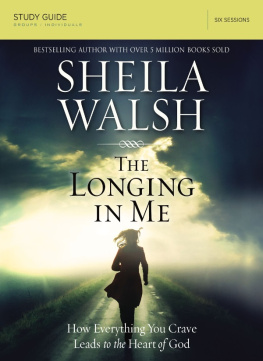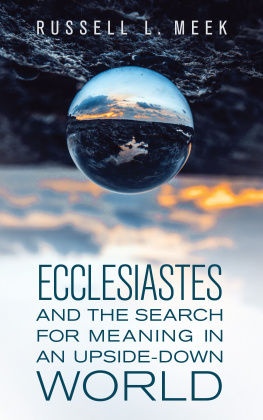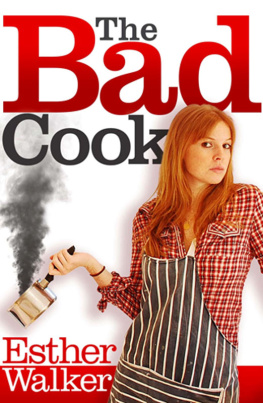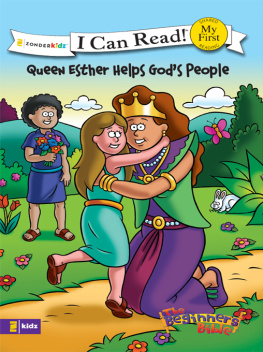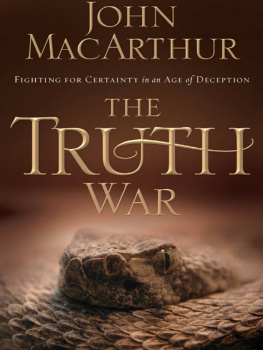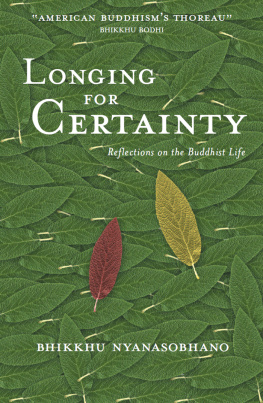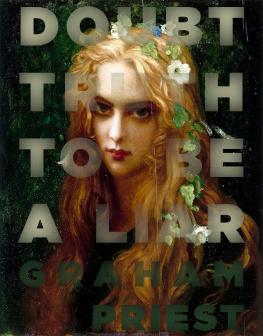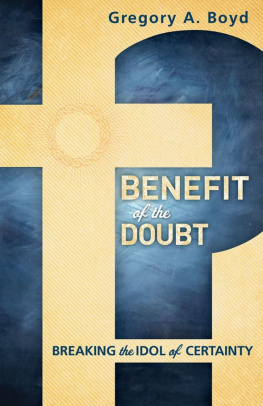Esther Lightcap Meek - Longing to Know
Here you can read online Esther Lightcap Meek - Longing to Know full text of the book (entire story) in english for free. Download pdf and epub, get meaning, cover and reviews about this ebook. year: 2003, publisher: Baker Publishing Group, genre: Religion. Description of the work, (preface) as well as reviews are available. Best literature library LitArk.com created for fans of good reading and offers a wide selection of genres:
Romance novel
Science fiction
Adventure
Detective
Science
History
Home and family
Prose
Art
Politics
Computer
Non-fiction
Religion
Business
Children
Humor
Choose a favorite category and find really read worthwhile books. Enjoy immersion in the world of imagination, feel the emotions of the characters or learn something new for yourself, make an fascinating discovery.
- Book:Longing to Know
- Author:
- Publisher:Baker Publishing Group
- Genre:
- Year:2003
- Rating:4 / 5
- Favourites:Add to favourites
- Your mark:
- 80
- 1
- 2
- 3
- 4
- 5
Longing to Know: summary, description and annotation
We offer to read an annotation, description, summary or preface (depends on what the author of the book "Longing to Know" wrote himself). If you haven't found the necessary information about the book — write in the comments, we will try to find it.
Longing to Know — read online for free the complete book (whole text) full work
Below is the text of the book, divided by pages. System saving the place of the last page read, allows you to conveniently read the book "Longing to Know" online for free, without having to search again every time where you left off. Put a bookmark, and you can go to the page where you finished reading at any time.
Font size:
Interval:
Bookmark:

2003 by Esther Lightcap Meek
Published by Brazos Press
a division of Baker Publishing Group
P.O. Box 6287, Grand Rapids, MI 49516-6287
www.brazospress.com
Ebook edition created 2011
All rights reserved. No part of this publication may be reproduced, stored in a retrieval system, or transmitted in any form or by any meansfor example, electronic, photocopy, recordingwithout the prior written permission of the publisher. The only exception is brief quotations in printed reviews.
ISBN 978-1-5855-8453-6
Library of Congress Cataloging-in-Publication Data is on file at the Library of Congress, Washington, DC.
Contents
Foreword
This is a book about knowing. Knowing is an activity that all of us are involved in, all of the time. Usually knowing happens without our taking great thought to the process. But sometimes we stop and think about what were doing. When we stop and think, what we were doing without much thought becomes murky indeed.
Its good and useful to stop and think about knowing, even if it means tackling something murky. For one thing, the circumstances of our lives at times force us into the cellar, so to speak, to examine the foundations of our beliefs. For another, the exercise serves to enhance and extend our everyday knowing, as well as give us fresh confidence in our efforts.
Who Needs to Read This Book, and Why
This book is written for all knowers. But it in particular targets knowers propelled into the cellar of their beliefs by one or more of the following circumstances of life.
First, I have in mind people who wrestle with questions concerning truth and the possibility of knowledge as a result our cultures recent consensus shift from modernism to postmodernism. Philosophically, the shift has been centuries in the making, but it has only in recent decades reached the street. We have gone from struggling to conform to stringent criteria to shore up our claims to absolute, objective truth to outright rejection of the entire enterprisefrom absolute truth to no truth. Affirming no truth is not always a comfortable position for a human being. It leaves nagging questions. This book deals with those questions.
A second huge circumstance of life is growing upmoving from adolescence to adulthood. This changeover, in our day and age, quite frankly takes a long time. People who are middle aged like me can feel as if they are still growing up. I have first-hand experience! At the other end of the age spectrum, we often comment, young people are forced to grow up sooner than they used to. Your particular age doesnt qualify you for or disqualify you from this category. What qualifies you is that you deal with questions about what is really real and good and how you know, questions to which you were presuming someone elses answers but now are faced with deciding for yourself. As we grow up, we often have to take that trip to the cellar to scrutinize the foundations of our beliefs. This book aids that foray.
Third, this book is written for people who are considering questions about truth and how we know because they are considering Christianity. Christianity is the belief that what the Holy Bible says about God and his relationship to the world is true, and that trusting Jesus is the only way to be right with God. It involves, in short, affirming that certain claims are true . People considering Christianity includes people who have not yet embraced it, as well as people who have, but want or need to think it through more deeply.
Affirming the claims of Christianity has always involved people in thinking about why those claims are not wrong . This is how things were when I was a child. Later, affirming Christianity involved people in defending why those claims were not meaningless . I felt this in my late teens and early twenties, as I encountered philosophies that argued that only sense perceptionbased scientific claims were meaningful, and the restreligious, psychological, ethical, artistic, and historicalwere more like gibberish. But in the postmodern era, affirming Christian claims as true involves people in defending, often in the face of tremendous wrath, why those claims are not morally outrageous . A claim that something is universally true is something akin to Hitlers concentration camps, a huge and damaging imposition on others freedom. People considering Christianity, then, simply cannot avoid the more foundational questions concerning truth. To these people, I very much want this book to bring direction and hope.
My Debt to Michael Polanyi, and Others
In these pages I develop a proposal concerning how knowing works. I believe that many questions can be answered at least preliminarily, and many puzzles solved, and personal hope of truth restored, by appropriating this model of how we know. I believe the model is confirmed by the ordinary day-to-day experiences of every human being.
The model of knowing I use belongs first to scientist and philosopher Michael Polanyi. A Hungarian who died in 1976, Polanyi published books and essays from the 1940s to the 1960s that at the time were not widely known or received. His message was revolutionary and consequently inflammatory. Recent shifts in philosophical outlook, I believe, have had the result that more people are taking notice of what he had to say.
I have chosen not to say, Polanyi says... at every turn in this book, although I could have! I have done this, first of all, because I want this book not to read like a textbook, but rather like a personal meditation.
Second, I have thought about Polanyis model for at least twenty years. For my doctorate I wrote a dissertation on his work. Recently I have looked back and recognized a gradual movement in my life from describing his work to taking it as a personal working hypothesis in thinking about knowing, to downright appropriating it. I commend it to you now as very much my own conviction. You will see that it shapes my understanding of many aspects of my life. In fact, I try to live his model, and I try to help the reader do that too. I have applied it in fresh ways. Polanyi never knew popular postmodernism. I believe that his model nevertheless contains within in it a profound response. Polanyis model was not developed primarily to accommodate theism; it is my claim that it aptly suits what Scripture indicates about human knowing. Polanyis environment, as a scientist, was the research lab; mine, as a teacher and mom, has been, so to speak, the kitchen table (that wonderful place where teaching and parenting intersect!).
And third, in the process of appropriating Polanyi, I have also adapted the model, especially in light of the contributions of theologian John Frame, whose work I take to represent accurately the stipulations about human knowing indicated by Scripture. One very helpful feature of Frames approach is his consistent delineation of three dimensions of human knowing. In this book I refer to them as the world, the self, and the word, or directions. I unpack Polanyis model in reference to these three dimensions.
So please do not take my avoiding reference to his name as discredit to Polanyi! If you want to get the model from the horses mouth, in its pristine and (Garden City, N.Y.: Doubleday Anchor Books, 1966).
The application of this model to knowing auto mechanics and God, with critical reliance on the Holy Bible and the compelling insights additionally of John Calvin, C. S. Lewis, Lesslie Newbigin, Annie Dillard, and numerous others, is my own personal, risky, and responsible submission in pursuit of reality.
My auto mechanic, featured in this books driving illustration, merits my gratitude. I am grateful for his reliable character, skill, and service. I include in my gratitude not only Jeff, but his entire staff at the Kirkwood Citgo. Not many people enjoy such confidence in their auto mechanics. But Jeff has no idea how he will serve to expedite many peoples understanding of knowing, and knowing God. This, as a surprising manifestation of unanticipated consequences, is indeed a confirmation of his reality.
Next pageFont size:
Interval:
Bookmark:
Similar books «Longing to Know»
Look at similar books to Longing to Know. We have selected literature similar in name and meaning in the hope of providing readers with more options to find new, interesting, not yet read works.
Discussion, reviews of the book Longing to Know and just readers' own opinions. Leave your comments, write what you think about the work, its meaning or the main characters. Specify what exactly you liked and what you didn't like, and why you think so.

